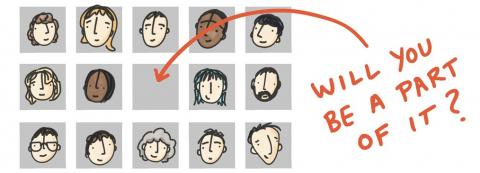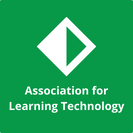
For ALT’s 25th Annual Conference, we will bring together different critical perspectives in Learning Technology from across our community that will examine the challenges ahead and question the shape of things to come.
Call now extended to 26 March 2018
We now invite you to submit a proposal under one of the following themes:
- Participation through Learning Technology: including how to use technology to work in partnership with learners, how to create engagement and built informed consent, critical digital literacy, accessibility and equity;
- Collaboration for Learning Technology: such as working together on projects, scaling up innovation, the role of staff empowerment and leadership, collaboration or across institutions and countries, how learning technology can enhance (a)synchronous collaboration;
- Critical perspectives in Learning Technology: critical, historical and political perspectives, research and analysis that question the purpose or impact of technology used for learning, teaching or assessment; learner driven education;
- Openness and Learning Technology: for example open education practice, resources, policy for openness in education, open data and open governance;
- Wildcard: if your work doesn’t relate directly to any of the conference themes, then we encourage you to select the wildcard theme when submitting your learning technology research, practice or policy work from any sector including Further Education, schools, vocational learning and training, lifelong learning and work-based learning.
How to submit a proposal
We look for session proposals that will make an innovative contribution to the conference programme and be of value to other participants.
All submissions are made via this online submission form https://goo.gl/forms/2Mhk54LaMemTuT193
We ask you to submit a proposal of 500 words (max), using the form provided.
You can only submit 1 proposal as lead author/presenter. You can add additional contributors to your proposal and be a contributor to other proposals.
All rooms (except for the main auditorium) are flat floored and we provide a projector, screen and laptop as standard.
As there are 6-8 parallel sessions running at any time, you need to ensure that your session can work well with 10-50 participants.
Your proposal
You will need to select what kind of session you would like to run from the following options:
- Work-in-progress report/experimental session (30 min, usually interactive and seeking feedback from participants)
- Short presentation (20 min, with min.5 minutes for Q&A)
- Research session (30 min, with min. 5 minutes for Q&A at the end, usually in the main auditorium)
- Lightning talk (5 min, concise, punchy talk, usually in the main auditorium)
- Poster & poster talk (digital/print poster + 5 min lightning talk, usually in the main auditorium)
- Discussion panel or forum (1 hour, usually with min 3 presenters)
- Workshop or demonstration (1 hour, usually BYOD for participants)
You will need to include a session title, description and further supporting information. You should not submit proposals that have been published, presented or submitted elsewhere.
What we are looking for
We review all submissions to ensure that we maintain the highest quality and include the broad range of learning technology research, practice and policy of interest to our participants.
Each proposal will be reviewed by two members of the conference committee. We ask that you remove any information from your proposal that will identify you as the author, so that the review is conducted impartially. Proposals are reviewed against the following criteria:
- Does it explain how the session relates to the chosen conference theme?
- Is it clearly written (i.e. acronyms are explained, and language appropriate for an international audience and from participants from different sectors)?
- Does it state what participants will gain from the session and why they should attend?
- Does it include details of what the session is based on, such as a particular project or initiative or practice? Does it critically reflect on this and evaluate it (i.e. state how many learners/staff are involved, what feedback was collected and how transferable your experience/findings/tools are)?
- If it is a commercial proposal, we ask that it meets all the above criteria and clearly states what products are being demonstrated or discussed and acknowledges the role of the company in the session.
Greater professional recognition for individuals and teams
The conference provides an international stage for gaining recognition for the work you do as an individual or team. In addition, you should consider entering the Learning Technologist of the Year Awards. The Awards celebrate excellent practice and outstanding achievement in learning technology and open for entries in spring. The winners will be announced at the conference.
Alongside the conference programme we also offer sessions about gaining CMALT accreditation.
Increasing impact and widening dissemination for researchers
If you are seeking to increase the impact of your work or looking to disseminate research beyond the conference, we encourage you to make a submission to the Research in learning technology journal. The journal is a Gold Open Access journal and we do not levy any charges to ensure researchers can disseminate new work in learning technology as widely as possible.
We also invite you to consider entering the new ALT Research Awards which will open for entries in spring, with winners announced at the conference.
Registration for presenters
At least one presenter for each proposal needs to register for the conference. We offer a special early bird discount for presenters and we also offer a discounted rate for presenters who are members of ALT or members of the conference committee.
Lead presenters need to attend in conference in person, but can facilitate contributions from virtually attending presenters.
Is this conference for you?
We invite proposals from learning technology professionals and learners from all sectors in the UK and internationally. The Association for learning technology (ALT) represents individual and organisational members from all sectors and parts of the UK. Our membership includes practitioners, researchers and policy makers with an interest in learning technology. Our community grows more diverse as learning technology has become recognised as a fundamental part of learning, teaching and assessment.
What to expect?
This is the 25th ALT Annual Conference. We will welcome 400-500 participants in Manchester over three days with a packed programme and social activities. We design our conference to be welcoming and friendly, with specific activities for first time participants. During the conference ALT members organise meetings and sessions such as annual meet ups of local Member Groups, meetings of Special Interest Groups and information sessions to offer ways to get involved and showcase what’s going on across the community.
You can read about the experience of previous participants in their own words in our blogpost round-up or post a question #altc on Twitter.
We look forward to welcoming you in September and wish you good luck with your submission!
You can also view this Call for Proposals as a Google Doc or download a PDF.
